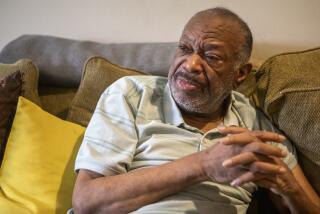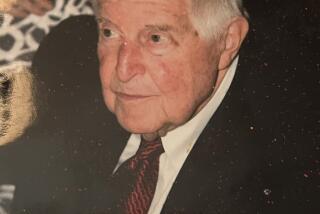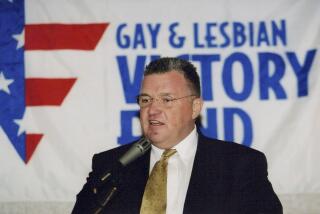Midge Costanza dies at 77; Carter aide
When Midge Costanza was appointed by President Carter as his assistant for public liaison in 1976 and given coveted space near the Oval Office, the outspoken New Yorker predicted she might not last.
“Either I will function as a window for the president, or I won’t be in Washington” for long, she told a reporter.
Both predictions proved true.
Costanza and her staff reached out to disparate groups, providing access to all: youthful visitors on the White House tour, beatnik poet Allen Ginsberg, opponents of the B-1 bomber, feminists, racial minority leaders and American Indians.
She held the first White House meeting with gay activists and urged federal action to help the homeless and disabled.
And finally, she ran afoul of the “Georgia mafia” that surrounded the president when she began rallying women in the White House to lobby Carter to reverse his stand against federal funding of abortions. Her staff was reduced, her office was moved to the basement, her access to the president curtailed.
Costanza got the message. She resigned after 20 months.
“Although we share common goals and concerns,” she wrote Carter, “it has become clear that our approaches to fulfilling them are different.”
Costanza’s approach never varied: full-steam ahead in support of liberal ideals, with a sharp tongue, energy that never flagged, always remembering her working-class upbringing.
She died Tuesday at Scripps Mercy Hospital in San Diego after a long battle with cancer. She was 77.
Until recently she was working for San Diego County Dist. Atty. Bonnie Dumanis on an issue that engaged her passions: stopping the physical and economic abuse of the elderly.
Born Nov. 28, 1932, in LeRoy, N.Y., Margaret “Midge” Costanza was one of four children of Sicilian immigrants Philip Joseph Costanza and Concetta Granata Costanza.
Her parents ran a sausage-making business, the House of Costanza, in nearby Rochester. After graduating from high school, she became a secretary and for two decades worked for a local construction and real estate firm.
After years as a Democratic Party volunteer, Costanza was elected to the Rochester City Council in 1973, the first woman elected to the council. The next year she tried, unsuccessfully, to unseat a Republican congressman. Her campaign caught the eye of Carter, then governor of Georgia, who called her and volunteered to help.
In 1976 she returned the favor, serving as co-chair of his presidential campaign in New York and delivering one of the seconding speeches in favor of his candidacy at the national convention. When Carter was elected, he asked Costanza to join his White House inner circle.
Costanza hit Washington like a mini-whirlwind. She gave rousing speeches and became a favorite of the national press. During one interview, she called for the resignation of Carter insider Bert Lance, then the director of the Office of Management and Budget, who had been accused of financial improprieties.
After her Washington experience, she moved to Los Angeles, where she helped coordinate Shirley MacLaine’s Higher Self seminars. She served as a liaison to women voters for Gov. Gray Davis from 2000 to 2003.
By 1990 she had moved to San Diego County, continuing her activism on task forces for gay rights, AIDS research and help for the homeless.
She campaigned for U.S. Sen. Barbara Boxer and for the losing campaign of Kathleen Brown for governor. She tutored women, including Dumanis, on how to campaign for office.
She was an adjunct professor at San Diego State University in political science, communications and women’s studies.
In 2003 she founded the Midge Costanza Institute for the Study of Politics and Public Policy, with the goal of preparing more women for elective office.
Costanza, who never married, is survived by a brother, Anthony, in Webster, N.Y. Funeral services in Rochester were private; a public memorial is planned in San Diego next month.
She will be inducted into the San Diego County Women’s Hall of Fame on Saturday.
More to Read
Start your day right
Sign up for Essential California for the L.A. Times biggest news, features and recommendations in your inbox six days a week.
You may occasionally receive promotional content from the Los Angeles Times.






